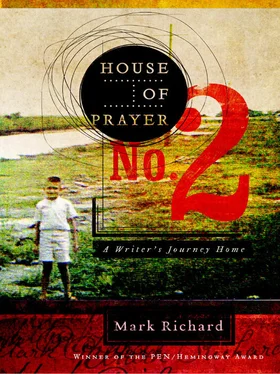And then you get a call from Melvin. You haven’t spoken with him in months; he says he has just had you on his mind, how are things in California? You tell him you are actually in Rocky Mount, North Carolina, where your father is dying. He says he’s on the interstate driving home from Greensboro and he’s coming up on the Rocky Mount exit with the blue hospital sign, and in about ten minutes he meets you in the hospital lobby. Long ago you have stopped believing in coincidences.
Melvin takes a room in your motel, and he has a quarter of a plastic bottle of bourbon, and you and he finish it and go out to dinner at a chain steak house, and you tell him all about what’s been going on and what’s been said these last two weeks. At the end of dinner Melvin says he thinks it’s time that you went home to your family, and you both later realize that that is the supernatural permission he had come to give you, though neither of you know it at the time.
In the morning Melvin goes up to the hospital room where your father sleeps and helps you rouse him. You introduce Melvin to your father, and Melvin leaves to let you say your goodbyes, and Melvin says later that your goodbye was awfully fast, that it was almost as though you were following him out the door into the hall.
You follow Melvin to his home in Virginia Beach, and you cook a big pot of gumbo for his family and leave it to simmer, and then you go down to Sandbridge Beach, way past the cottage Melvin saved you from before, you go down to the preserve where you had taken the girl from California on a break from handing out campaign literature and you had seen a red fox with a bushy red tail and had taken it as a sign that you would marry her, and you go out on the empty beach, and a couple of miles down you find the keel spine and wooden ribbing of an old shipwreck that a nor’easter has thrown up on the beach. From where you are to Hatteras south they call it the Graveyard of the Atlantic; there are over six hundred shipwrecks out there, and this is not unusual. The next storm will take the wreck back out again.
You sit, and you are very tired, and you try not to repeat the Rolltop Mantra of being disappointed in yourself. You worry a hand-hewn wooden peg from a joist on the keel of the wreck and put it in your pocket and start to walk away, then feel superstitious about taking it, so you walk back and kick the peg back into place, and the next night you are sleeping soundly at home in your bed with your wife and sons in California. You had said goodbye, and when he had asked, So, this is it? you had said, This is it , and when he had offered up his hand, you had taken it and shaken it and put it back in the folds of his sheet.

BEN’S GENERAL PHILOSOPHY IS people are generally doing the best they can. He tells you this as you wait for a Wanchese charter boat to take you through Oregon Inlet to the ocean buoy beyond, where you will scatter your father’s ashes off the Outer Banks per his request. You talk about your father and his famous anger. Ben says he may have inadvertently angered your father when your father appeared one afternoon at one of Ben’s little parishes with his next wife-to-be and insisted Ben marry them on the spot. Unprepared but willing, Ben cast around for a witness and was only able to enlist a handy black janitor. Ben says your father fumed and didn’t call him for years.
You tell Ben how you had adopted the Rolltop Mantra to defuse your father’s anger after the aquarium incident. The thermostat on your father’s beloved aquarium went on the fritz, and your father kept turning the heater up and up until the neon tetras and black mollies and guppies leaped out of the hot tank, landing in little gummy blobs on the dining room floor. While cleaning out the aquarium in the kitchen sink, your father saw a much smaller boy give you a thorough whupping in the backyard. Tapping on the window with his class ring, he summoned you inside. Your father shook some water off his fingers, landed a flying tiger across your face, then went back to rinsing the aquarium. You learned that whenever your father summoned you, especially to stand next to his rolltop desk, where a hundred cigarette butts smoldered in a large glass ashtray, you could re-cage the tiger simply by reciting, I am very disappointed in myself .
You rent a beach house for yourself and your wife and your two young sons, none of whom will be going on the charter boat. The morning of tending to your father, you go into the ocean alone at dawn, just when the convenience-store posters say not to, reminding people about the two fatal shark attacks that have recently happened just north and south of where you enter the water. AVOID SWIMMING ALONE AT DUSK OR DAWN IN A RISING TIDE. You make it out past the double sandbar, feeling the edge of a rip current so strong at one spot that it’s as if your legs are tangled in sheets. The waves are confused but insistent. They keep coming—their nature, their job. You swim and then try to make it in without dislocating either of your two new hips.
Your surgeon would not approve of this. Even with the two new hips you are still in the habit of looking down so as not to trip. You have always hated the way you walk. Once, walking with your wife, holding hands on a boardwalk, she said to look down and see your shadows together, and you refused. You won’t watch the reflection of yourself approaching storefront windows. A friend, possibly the boy from college with the melted face, said it wouldn’t be you without the way you walked. He said it’s as if you’re wading through something no one else can see. You stagger up onto the beach, find your towel, and wonder if that noise you heard was a sonic boom from Oceana Naval Air Station to the north or something else. With several pounds of titanium hip and femur in your body, you’re cognizant of lightning. You’re the first off the beach when thunder rumbles. When you lived in Virginia Beach that summer in the rich girl’s attic, a beautiful black-haired girl who rented boardwalk bikes and always wore a long one-piece bathing suit was split open down her chest when lightning found the zipper there.
Like Sam McGee happily sitting in the flames of the wrecked barge Alice May , you have considered cremation, as you can never be too hot, though going to hell, as you are learning, is not a compulsory thing to do, and in your mind you really don’t want some funeral director handing your sons a box of ash and molars and a shovelful of scorched titanium parts.
Your father hated the beach, had sand issues, couldn’t swim, and, like you, was actually terrified of water. At age four, you fell into a chocolate creek in East Texas. Your father stood beside you, fishing, you don’t think he pushed you; you were just the type of child who accelerated the odds of inevitable mishap. You stood beside water, therefore you fell in. Your father, unable to swim, saved your life by lying prone on the dock and reaching around frantically in the water until he found your shirttail. You were landed, drowned, and resuscitated by a doctor’s wife who later bathed you in a sink and tweaked your erection to staunch your crying.
Freud said storytelling is an unconscious desire to summon fears in order to be able to exorcise them. Your firstborn son with the twist in his spine accelerates the odds of inevitable mishap by sheer proximity to slick floors, wobbly chairs, sharpened pencils, hot stoves. You imagine him in these Outer Banks being sucked out by the notorious undertow, which has almost drowned all of your friends at some time during the last forty years. Stupidly surfing a big onshore hurricane break years ago, you got tumbled and spiked on your left shoulder, splitting the scapula in two. The doctor said it takes at least seven hundred pounds of pressure to split a scapula. Lucky it wasn’t your neck, he said. But what are you going to do? Not go back into the ocean, ever? Freud also said the most important day in a man’s life is the day his father dies. For now, you would suggest it’s the day your first son is born. You were your father’s only son, his firstborn.
Читать дальше













